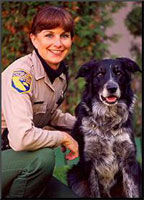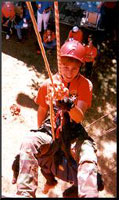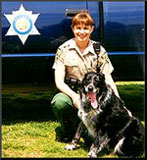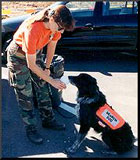| |
"She Wears A Badge, Game Warden Lynette Reynolds
"
The Fish Sniffer Magazine
July 17, 2001 -- BY JOAN CARTER
|
 
When most
of us think of a game warden we think of a guy in
a "Smokey the Bear" hat checking fishing and hunting
licenses. I found out that this picture is an outdated
cliché. Game Warden Reynolds of Clearlake, California
introduced me to some of the many facets of the
job she loves. Among other things, Lynette juggles
a family, a career, and a canine search and rescue
program that she began with her border collie Brett.
But I'm getting ahead of myself. Lynette has loved
animals all her life. She had worked with veterinarians
and was operating a dog grooming business when she
had the opportunity to buy a pet store in the Sonoma
valley. Part of her business included reptiles and
snakes. At a wholesalers to purchase some lizards,
she found he had some sick Asian Water Dragons.
She took them, called upon some of her vet knowledge
and some common sense, and got them healthy again.
This led to adopting more sick lizards and snakes,
healing them, and building special enclosures for
them upstairs at the pet store, some including waterfalls.
As she became more involved in the exotics aspect
of the pet trade, she became convinced she could
do more as a game warden than as a store owner.
Rennie encouraged her and talked her into getting
a two year Junior College Degree which she completed
in a year and a half. She envisioned herself working
as a Warden in airports, checking for illegal shipments.
The testing process for Fish and Game took quite
a while. Tests for vision, color blindness, physical
ability and endurance were followed by batteries
of verbal tests.
During this period she worked as a Seasonal Aide,
getting some practical experience. In 1989 Lynette
went to the first Fish and Game Academy session
in Napa, California. Confined to the compound, she
placed her children with her ex-husband, and began
classes in vehicle codes, penal codes, first aid,
and more. The academy takes longer than other law
enforcement academies like the CHP, because it includes
the same legal aspects and the added regulations
specific to Fish and Game. Once you have passed
the grueling testing process, an even tougher road
opens up. There are few jobs and the competition
is fierce. Six months later Lynette collected a
graduation certificate and her children and was
off on a new career. As a result of her education
and her seasonal work, Lynette came to realize that
her focus had changed from reptiles to native animals.
City living near a major airport would have been
an expensive proposition for a single mom, and Lynette
had enjoyed her field work. She was offered and
gladly took a position in Lake County, California.
In her duties as a warden, Lynette often rode her
horse. The department also allows wardens to work
with a companion dog. This is not a working dog,
merely a pet, and she took Mandy along until she
was getting too old. After Mandy died, Lynette found
a border collie and named him Brett. She wanted
to train him to do some detection and work with
the horse. While operating her grooming business,
Lynette also did dog obedience training. As she
worked with Brett she got strong indications that
he was capable of learning rapidly. She researched
what law enforcement dogs had to do, and trained
him to their guidelines. Getting him tested and
certified was another matter. Since she was not
a professional law enforcement trainer and Brett
wasn't a German Shepherd or a Rottweiler, no one
was interested. She took Brett out on a call where
a Highway Patrolman had been reported missing. Since
he had been trained in gun powder detection, Brett
located the clip from his handgun and eventually
found the injured officer.
The CHP was so impressed that they gave Brett his
test and he passed with flying colors. Brett and
Lynette were getting called out more and more often
for scent detection, especially those involving
weapons or ammunition, and also search and rescue.
The case load led to Lynette creating a team unit
with five handlers and five dogs. In three years
this has grown to 20 handlers, seventeen of whom
are women. These dogs are not attack dogs, when
they are not on duty they are family pets, but they
are all trained in air scent, ground scent or both.
Trailing, or the use of both air and ground scent,
is an extremely effective locating technique. This
search and rescue team is not affiliated with the
Fish and Game Department, and is another of Lynette's
many activities.
 
Three DFG K-9 teams are now in service with the
Department of Fish and Game. Warden Kathy Ponting
and her Rottweiler Kodiak work in the Central Valley/Hanford
area; Warden Lynette Reynolds with Brett, her Border
Collie, in Lake County; and Warden Patrick Woods
patrols with his German Shepherd, Lesko, in the
Eastern Sierra/Bishop area. Along with their detection
and tracking duties, these K-9s are trained to protect
their partners as they partrol remote areas where
law enforcement backup is rare. Statistics show
that work as a game warden is extremely hazardous.
In fact, wardens suffer nine times more assaults
than other law enforcement officers. A K-9 partner
offers a major deterrent to physical assault.
On the job, Lynette is involved in many large cases.
She is presently working on an abalone poaching
case which could lead to five indictments. In the
environmental area she is working on a case involving
the complete diversion of a stream and the resulting
death of all the downstream trout. With the proliferation
of agriculture and vineyards in her county, this
has become a big problem. Dumping of hazardous waste
into streams and ground water is another big problem.
Fish and Game is called out whenever a vehicle accident
threatens to leak fluids into waterways. Lynette
has had her share of deer and possum type calls,
and even a close encounter with a black bear. She
was dispatched to a trailer park to remove a black
bear from under a porch. She was instructed to walk
her across the road and into the hills. Lynette
would have preferred to wait a couple of hours for
equipment to anesthetize the bear and transport
it. Attempting to encourage the bear across the
road, it suddenly turned, glared at her, and began
running towards her like a freight train. Lynette
waited until the last possible moment, hoping it
was just a false charge, but had to shoot. She pumped
six bullets from her 357 into the bear and it finally
fell at her feet. On closer examination, the bear
appeared to be an old sow, probably senile, thus
causing the confrontation. It was a sad solution
to the problem of infringing territories.
I asked Lynette what she looked for in her future.
She said she had thought of promoting, but was really
happiest working as a warden and field training
officer. Rookies spend about three weeks training
with a field officer in specialized areas. Lynette's
specialties are private lands, public relations,
and night work. She feels she can help focus her
trainees and help them to make an impact through
their careers. She wants to continue working in
conservation education, the search and rescue operations,
and in promoting the canine program of the department.
As with all agencies, the canine program needs funding.
The first year's training of a new dog and handler
costs around $10,000. Her work in the schools will
ensure that generations to come will understand
the guardianship we must assume for all living things
and the eco-systems they inhabit. "Instead of just
penalizing people, I want to educate them!"
To learn more about the Fish and Game Department
and their many programs, you can visit their website
at http://www.womentechworld.org/bios/game/articles/she.htm#
Originally published September 23, 1999
"It was kind of a make it or break it," Lusky said.
"I guess I made it."
Columnist Joan Carter co-owns, with her husband,
Dan Carter's Guide Service.
http://www.womentechworld.org/bios/game/articles/she.htm#
|
|
|
|
|



